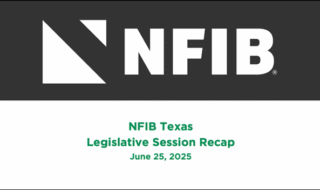April 12, 2025
Legislative Update — Weeks 12 & 13
State Director Patrick Connor reports from Olympia on the small business agenda for the legislative weeks ending April 4 and April 11
Two key legislative deadlines have passed since our last update. Wednesday, April 2, was the last day for policy committees to approve bills originating in the opposite chamber. Tuesday, April 8, was opposite chamber fiscal cut-off, meaning most bills impacting the budget had to be approved by budget-writing panels by the end of that day. As a result, we are down to about 30 bills still in play that are of interest to small business owners.
Both chambers have been holding all-day floor sessions, considering bills from the opposite chamber, since Wednesday, April 9. That will continue until session adjourns April 27.
The Senate has so far spent most of the day, Friday, April 11, in closed door caucus meetings, which is unusual for that body. The Senate, under the leadership of Sen. Jamie Pedersen, has a reputation of operating as a well-oiled machine. Rumor has it yesterday’s contentious rent control debate caused a serious meltdown in the majority Democrat caucus. In any event, the Senate will either be forced to work longer hours or shorten its list of bills to consider in order to meet the April 16 opposite chamber cut-off.
Over in the House, SB 5041, unemployment insurance for striking workers, was amended then passed on a 52-43 vote with three excused. NFIB had sent an action alert earlier in the morning (April 11) asking members to make a last-ditch effort to contact their state representatives, urging a NO vote on the bill.
As we’ve reported previously, if a strike occurs at a business that is already at or hits UI Rate Class 40, or if that employer closes its doors, the cost of benefits paid to its striking workers would be socialized among all other employers in the state — including small businesses uninvolved and likely far removed from the strike. Washington employers are still paying a pandemic-era unemployment tax surcharge intended to keep the Trust Fund solvent. Instead of the promised tax relief from the expiration of that surcharge, SB 5041 threatens UI rate increases over the next decade.
The Budget & Taxes
A conference committee has been appointed to negotiate a new two-year operating budget for the 2025-27 biennium. These negotiations are happening behind closed doors and are likely to include a significant tax package.
In a recent press conference, Gov. Bob Ferguson again called on the Legislature to include his proposed budget cuts, and continued to turn a rhetorical cold shoulder to tax increases in general.
The governor reiterated his opposition to a wealth tax (“financial intangibles tax” or FIT), which both House and Senate Democrats included in their respective revenue plans. Ferguson pointed out the idea has not been tested in the courts and should not be relied upon to help balance the state budget. We would not be surprised to see a smaller wealth tax, not tied to specific budget needs, enacted this year as a trial balloon to take to the courts for approval.
Gov. Ferguson also stepped up his warnings about President Trump’s threatened cuts to states with immigration sanctuary laws, like Washington. The governor’s office followed up with a media release noting that Washington receives some $43 billion per biennium from the federal government, nearly 30% of our two-year budget total. We think it likely that these warnings are a precursor to Ferguson embracing a more robust tax package after all, which can be blamed on the federal administration.
Speaking of taxes, small businesses have so far avoided a significant general tax hike under both state House and Senate Democrat proposals. NFIB is on record opposing both chambers’ property tax bills. The final tax plan likely won’t be released until very near the end of session. We will continue monitoring developments on this front and oppose any bills targeting our members for tax increases.
Priority Bill Overview
HB 1213, expanded Paid Family & Medical Leave mandates
Current law follows the federal Family Medical Leave Act, which requires job protection and continuation of health insurance coverage during a worker’s approved leave if the employer has 50 or more employees. The House-passed version of HB 1213 would apply to all employers, regardless of size. The 10th and most recent fiscal note still shows the bill would cost nearly $1 billion over six years, forcing rate increases above the existing 1.2% of payroll cap. The Senate Ways & Means Committee added an amendment phasing in the decrease in business size for job protection and health insurance maintenance. As amended, the requirements would apply to businesses with 25 or more employees beginning in 2026, 15 or more in 2027, and 8 or more in 2028. The bill is now in Senate Rules. While the amendment improved the bill, NFIB continues to be opposed.
HB 1308, Personnel records
This bill would give employers 21 days to provide a current or former employee with a complete copy of their personnel file or face a lawsuit and financial penalties. NFIB issued an action alert in advance of the Senate vote. The Senate amended the bill to remove subsection “g,” a gotcha, catch-all provision that invited litigation to establish if a document should be included in a personnel record. An amendment to provide an administrative remedy for aggrieved workers was defeated on a voice vote. The bill will return to the House for the concurrence or dispute process where the House can concur with the Senate amendment, reject the amendment and ask the Senate to recede from its position, or call for a conference committee to negotiate a compromise bill. NFIB remains opposed to the bill.
HB 1382, All Payer Claims Database
This health-care cost transparency measure is currently in Senate Rules. NFIB supports the bill.
HB 1409, Clean fuels
Accelerating carbon intensity standards without an adequate supply of alternative, clean fuels available to producers sets the state up for failure and threatens to substantially increase costs throughout the supply chain. Small businesses and working families are already struggling to keep pace with runaway fuel costs due to inflation and regulations like these. The bill is in Senate Rules. NFIB opposes the bill.
HB 1483, Right to Repair digital electronics
The Senate approved this NFIB priority bill with additional agreed-to amendments exempting certain medical devices and avionics. We expect the House will concur with the Senate changes and send the bill to Gov. Ferguson for signature.
HB 1533, Specialty electrician rules
Today, the Senate is expected to consider this modest but useful improvement to electrician training rules to allow apprentices to perform specialty electrical work (residential wiring, for example) without disrupting their participation and status in the general electrician training program. NFIB supports the bill.
HB 1788, Workers’ compensation benefit increase
The bill is a $36 million or more benefit increase over five years. This will add more pressure to increase workers’ compensation premiums yet again. These taxes have increased 13% over four years. NFIB agrees that the time-loss wage replacement calculation process is deeply flawed, but throwing more money at a broken system will not fix it. Instead, we’ve asked for an amendment directing the Department of Labor & Industries to convene stakeholders over the interim to develop recommendations to streamline the time-loss wage replacement calculation process and improve system fairness. The bill is on the Senate 2nd Reading Calendar and could be brought to the floor at any time. NFIB opposes the bill.
SB 5041, UI for striking workers
The bill passed the House 52-43 after being amended.
SB 5408, right to cure defective job postings
The House Labor Committee approved a hostile amendment undermining the purpose of the bill. The original version would give employers 10 days to correct an online job listing that does not properly describe the salary and benefits of the position. Washington employers have been besieged by $500 million in legal claims churned out by Seattle lawsuit mills, most over unauthorized postings scooped by third-party job search websites that fail to meet state requirements. Worse yet, most plaintiffs are not actual job applicants. Many live out of state and had no intention of moving to accept a job if offered, did not meet the requisite minimum qualifications, or did not even complete an application. We are optimistic that the House will reject the committee amendment, and approve the original bill instead. The bill is still in House Rules. NFIB opposes the labor committee amendment, but supports the underlying bill.
Prior Legislative Reports
— March 28: Small Business Dodges Tax Bullets
— March 22: NFIB Testifies on Two Big WC, UI Bills
— March 15: How of Origin Deadline Passes, Sending Many Bills to an Early Grave
— March 8: Bill Giving Striking Workers UI Benefits Passes Senate
— February 28: Lawmakers Trying to Skirt Federal Law on Unemployment Benefits
— February 21: Minimum Wage Bills Dead For Now
— February 15: NFIB Members Turn Out in Force to Oppose Minimum Wage Bill
— February 8: Minimum Wage Bills Coming Up for First Hearings
— January 31: Entrepreneurs called on to testify on upcoming legislation by signing-in
— January 25: NFIB Testifies Against Giving Striking Workers Unemployment Benefits
— January 18: Washington State Legislature Begins 2025 Session
NFIB is a member-driven organization advocating on behalf of small and independent businesses nationwide.
Related Articles














